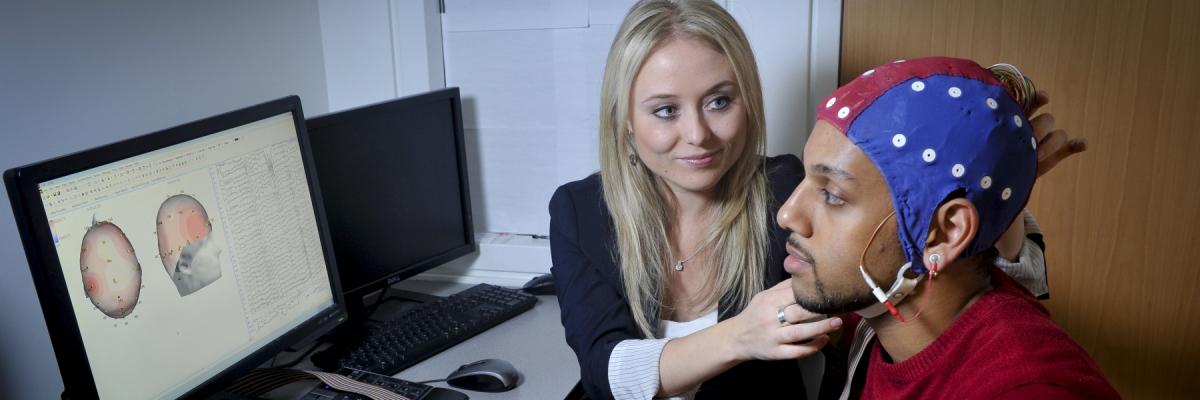Neuroscience is a highly interdisciplinary scientific field of study that offers insight into the structure and function of the brain and the nervous system. Our nervous system is responsible for an enormous range of tasks, from regulating essential body functions such as breathing and digestion to producing our thoughts, emotions, and behaviours. Neuroscientists are interested in understanding the normal development and activity of the nervous system, as well as what happens under atypical circumstances such as neurological injury (e.g., stroke, brain injury), neurodegenerative diseases (e.g., Alzheimer’s, Parkinson’s disease), neuropsychiatric disorders (e.g., addiction, schizophrenia, depression) and neurodevelopmental disorders (e.g., autism). Applied neuroscience research has the potential to produce evidence-based strategies for the diagnosis and treatment of nervous system disorders.
Neuroscience education can be a powerful tool for many future endeavours. Given the interdisciplinary nature of neuroscience, students interested in pursuing research-focused graduate programs may have a variety of viable options (e.g., Ph.D. in Neuroscience, Psychology, or Biology). A neuroscience background is also valuable for a range of applied professional programs (e.g., Master’s Degree in Physiotherapy, Occupational Therapy, Public Health), including medical school. Undergraduate education in neuroscience can also lead to a variety of direct-entry careers (e.g., research technician, data analyst, pharmaceutical sales).
Subdisciplines in neuroscience examine nervous system functioning at different levels of organization and analysis.
- Cellular and Molecular Neuroscience explores the nervous system at its most fundamental level, investigating the influence of genes, signalling molecules, and cellular morphology on the development and maintenance of brain function, predominantly through the use of in vitro techniques (e.g., immunohistochemistry, patch clamp).
- Systems and Behavioral Neuroscience examines the neural mechanisms underlying behaviour and how brain circuits work together to analyze external stimuli, internal biological states and past experiences in order to coordinate appropriate responses, predominantly through the use of in vivo approaches in behaving subjects (e.g., optogenetics, chemogenetics).
- Cognitive Neuroscience focuses on understanding the neural basis of human cognition (e.g., language, memory, attention, decision-making) predominantly through the use of patient neuropsychology and neuroimaging techniques (e.g., magnetic resonance imaging (MRI), electroencephalography (EEG)). Taken together, these complementary approaches work to foster a comprehensive understanding of nervous system dynamics.
Choosing Your Program
Our programs in Neuroscience provide and opportunity to study the biological basis of thoughts, feelings, and behaviours. A program in Neuroscience pairs well with many other courses and programs here at UTSC. A few of the most common double major pairings with Neuroscience include Psychology, Mental Health Studies, and Human Biology. While these are the most common pairings, there are many other options that are highly complementary to training in neuroscience (e.g., Computer Science, Population Health, and Molecular Biology, Immunology and Disease), and we encourage students to explore and identify the combinations that are most consistent with their interests.
Prospective students should visit the Admissions & Student Recruitment website for information on applying to Psychology at UTSC.
Program Types
We offer the following program options in Neuroscience:
| Program Type | Details |
| Neuroscience Specialist | The Specialist Program in Neuroscience is research-intensive and allows students to choose one of three streams to concentrate their studies: Cellular/Molecular, Systems/Behavioural, or Cognitive |
| Neuroscience Specialist Co-op | The Co-op option offers an experiential learning supplement to the Specialist program. |
| Neuroscience Major | Our Major program, which focuses on both Cellular/Molecular and Systems/Behavioural Neuroscience, requires fewer courses, allowing students to pursue a second major area of interest in a different program. |
For full program details, please visit the Neuroscience section of the Calendar.
